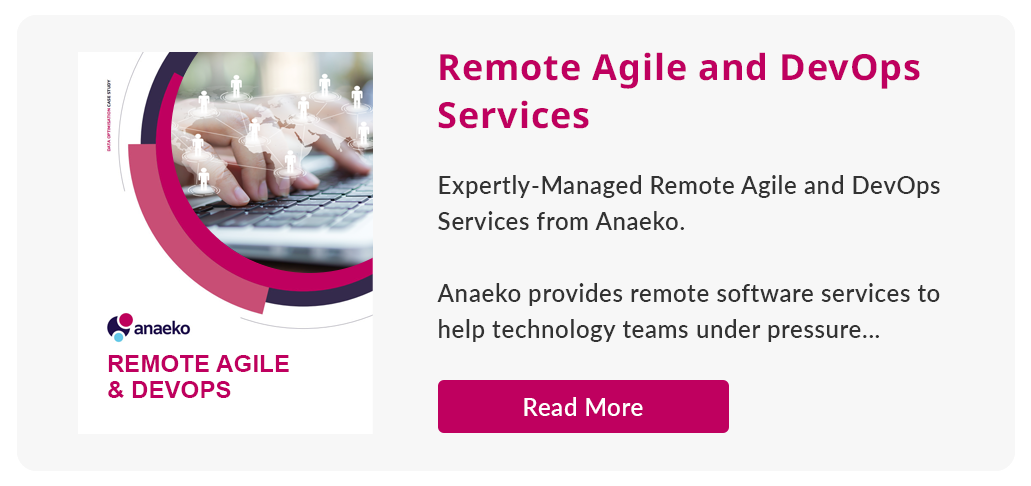At Anaeko, our core business has been built around our ability to access a pool of talented professionals who either work from their home offices or work as part of smaller teams in different geographical locations. We have a proven track record in effectively managing these teams within a remote agile team framework.

Recent world events have had a major impact on the wider working population and this has highlighted the need for teams to operate in a similarly dispersed manner. Teams and individuals must now micro manage their own time within their available working hours.
Gone is the standard 9 to 5, individuals typically have pockets of time throughout the day to work on their assigned tasks. This makes the job of managing teams extremely difficult, so below we have shared some experiences to hopefully make the journey to remote agile team management more efficient for your organisation.
The challenges of remote Agile team management are:
- Managing team members in different time zones.
- Building personal relationships with team members in these remote locations.
- Different working cultures, working hours and vacation periods.
- Finding common time for all team members to join discussions.
Some management strategies to help combat these challenges are:
- Split the items of work up into clearly separated epics, which can be developed and tested within the same relative time-zones.
- Hold regular code reviews and demos. This ensures the distribution of knowledge of new features around the project’s teams. Always record demos and store the recording within your CMS.
- Communication tools are also key, team Slack channels and daily stand-up Slack channels give visibility across time zones and provide a history to report on the progress of the features.
- Team meetings should be held at times that overlap with all of the team members core business hours. If this is not possible, a team delegate should liaise with team leads to present status reports. The delegate should in turn report back to the local team on the overall project status.
- Delegate the ownership of epics to individual remote teams.
- Over communicate the information related to the status of the project, and overall progress. This is done to ensure all team members are reminded of the importance of meeting their commitments. The delegation of the ownership also builds trust and a stronger personal relationship with the remote team members. Due to the fact that not all activities are visible across the teams, having this trust means that problems can be raised quicker and resolved quicker.
- Create templates for raising tickets/bugs/defects. Too often there is not enough information in a bug and the person who created the ticket is offline when the assignee picks up the ticket. Templates should contain a check box of items, which should be reviewed and completed during ticket creation, this should allow for effective troubleshoot and reduced turnaround time on defects.
- Key information related to design, troubleshooting guides, project related decisions and general communication should be stored in a central repository. Make sure these spaces are properly structured and audited to make sure information is completely up to date.
- Keep a central record of each team members expert subject area, try to ensure there is strong coverage of knowledge across the geo team locations. This reduces the possibility of blockers i.e. having domain knowledge in each location allows issues to be unblocked in a timely fashion.
- Team leads should always remember to thank their team members. Regular kudos callouts help keep people engaged and provide a sense of recognition that their work has not gone unnoticed.
- Always double check the tone and structure of communication, especially when team members use different spoken languages. Written communication can often be taken out of context and can lead to tension amongst team members. If in doubt setup a call to discuss!! It’s always better to talk!! Remember... over communicate!
If you have any further questions related to the projects we have managed within a remote agile framework, please contact one of the team, we would be only too happy to introduce you to our practices.
Anaeko are Hiring!
If you are an enthusiastic and energetic software engineer looking for continuous challenges in a rewarding role, then get in touch.
We are hiring multicloud data and platform engineers across Go, Kubernetes, Python, Java, .NET and Angular to name but a few.
Topics: Agile Systems, Agile, Remote Working, Remote Agile and DevOps, agile management




%20(Facebook%20Event%20Cover)-55.png)